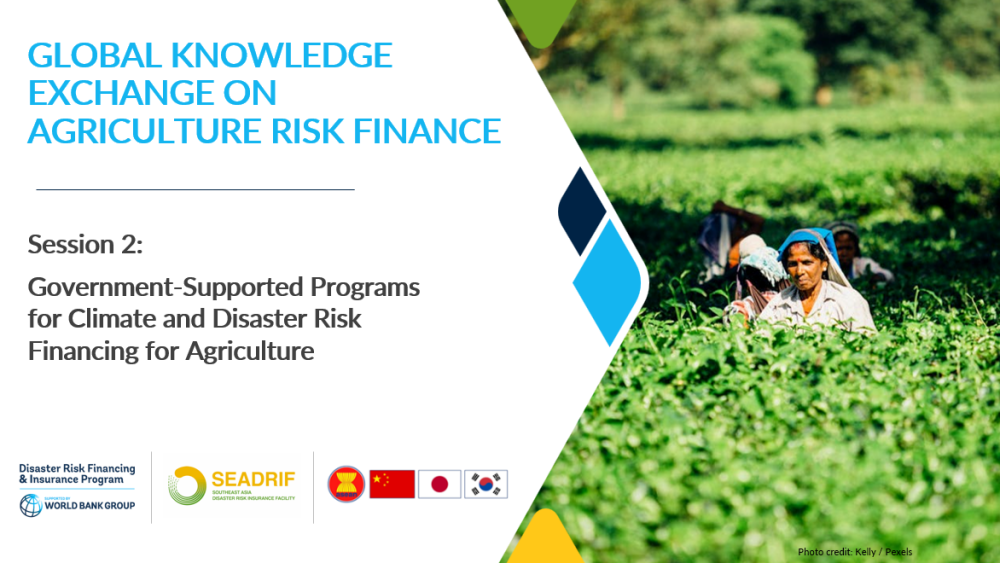[Event Recap] Session 2: Government-Supported Programs for Climate and Disaster Risk Financing for Agriculture

The second webinar in the Global Knowledge Exchange on Agriculture Risk Finance Webinar Series "Government-Supported Programs for Climate and Disaster Risk Financing for Agriculture" was held on 27 November 2024. The series was launched on October 30, 2024 by the World Bank Group’s Disaster Risk Financing and Insurance Program in partnership with the ASEAN+3 Disaster Risk Finance Initiative, ASEAN Secretariat and Southeast Asia Disaster Risk Insurance Facility (SEADRIF).
The second webinar discussed government-supported programs for climate and disaster risk financing for agriculture as part of contingent liabilities management, looked into market inefficiencies these programs try to address, introduced various instruments and their benefits and limitations, and shared experiences and lessons learnt during implementation of these programs. In the opening remarks, Shunichi Takenaka (Director for Promotion of Regional Financial Cooperation, International Bureau, Ministry of Finance, Japan) reflected on the discussions in the first webinar held in October 2024, highlighting the importance of well-coordinated policy, legal, and institutional frameworks for successful implementation of climate and disaster risk financing solutions. He emphasized Japan’s long-standing commitment to the financial resilience agenda, including its support for initiatives like SEADRIF and ASEAN+3 DRF in partnership with the World Bank. Furthermore, he called for attention to the critical role of government leadership in building financial resilience to protect rural livelihoods, ensure food security, and address the growing risks posed by climate shocks.
Following the opening remarks, Hang Thu Vu (Senior Financial Sector Specialist, Crisis and Disaster Risk Finance, World Bank Group) delivered the framing presentation outlining the rationale behind government-supported agricultural risk financing programs, covering what these programs are, why governments’ support is needed , and how we the programs can be implemented through fiscal and non-fiscal support measures. She discussed government disaster-related contingent liabilities management, market inefficiencies, and various benefits of these programs. Acknowledging their limitations, she emphasized the importance of building sustainable programs and striking a balance between government support and long-term private sector involvement for successful implementation.
The framing presentation was followed by three country presentations, India, Korea and Thailand, which discussed the country experience with government-supported programs for agricultural risk financing in their respective country context.
- India: Sweta Satya (Indian Economic Service, Deputy Secretary, Department of Agriculture and Farmers' Welfare, India) introduced India's agricultural credit and insurance programs which provides farmers with digital access to credit at subsidized interest rates. She emphasized that the data-driven approach ensures efficient, transparent, and inclusive financial services, promoting the participation of all farmers including women, for their protection and development.
- Korea: Seungyoon Lee (Assistant Manager, Agriculture Policy Insurance & Finance Service (APFS), Korea) elaborated on Korea's comprehensive farmer income stabilization framework, implemented through a combination of different programs such as crop insurance, disaster relief funds, and direct payment. He also presented how the government effectively addresses moral hazard concern in the public crop insurance program through institutionalized approached.
- Thailand: Pasu Tuomsem (Economist, Fiscal Policy Office, Ministry of Finance, Thailand) presented the overview of Thailand’s evolving agricultural risk financing strategies from both the policy and fiscal perspectives. He delved deep into the rice and maize programs, and demonstrated how different government-support programs are coordinated to create effective synergies for strengthening the agricultural sector.
The presentations were followed by an engaging question-and-answer session. The discussions highlighted the unique nature of agricultural insurance markets and the government's role in filling market gaps, and the coordination between public and private sectors in delivering cost-effective agricultural insurance solutions. The webinar concluded with remarks from Emiko Todoroki (Acting Practice Manager, Crisis and Disaster Risk Finance, World Bank Group) who highlighted the World Bank's commitment to supporting knowledge sharing across countries and regions, emphasizing the continuation of this event's efforts through future webinars in the series to strengthen agricultural resilience.
The event, facilitated by Shoko Takemoto (Disaster Risk Consultant, Finance, Competitiveness and Innovation Global Practice, World Bank Group), saw 325+ registrations and attended by 160+ participants, including practitioners and policymakers from around 53 countries.
Resources:
Click here to download/view the webinar:
-
fact sheet
Visit the Webinar Series resource page to download content from earlier webinar.
For updates, news, and articles on Disaster Risk Finance, please join our LinkedIn Group and Community of Practice.